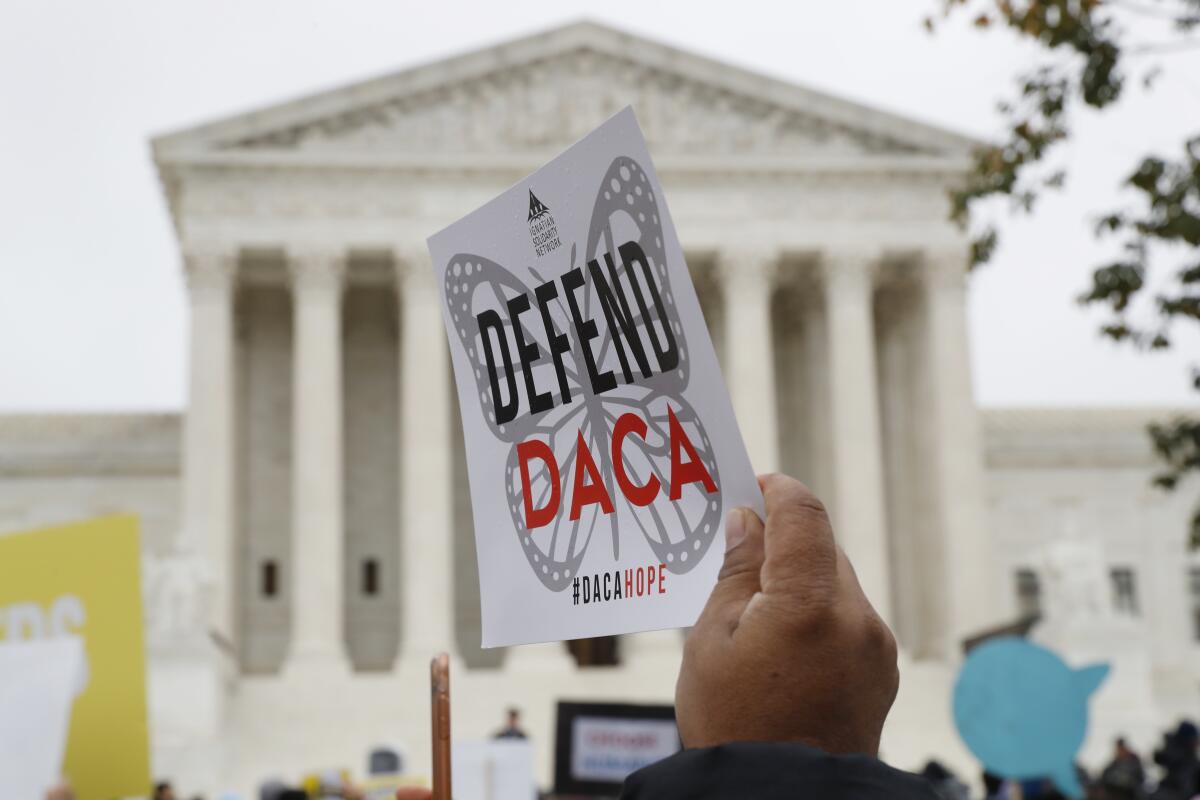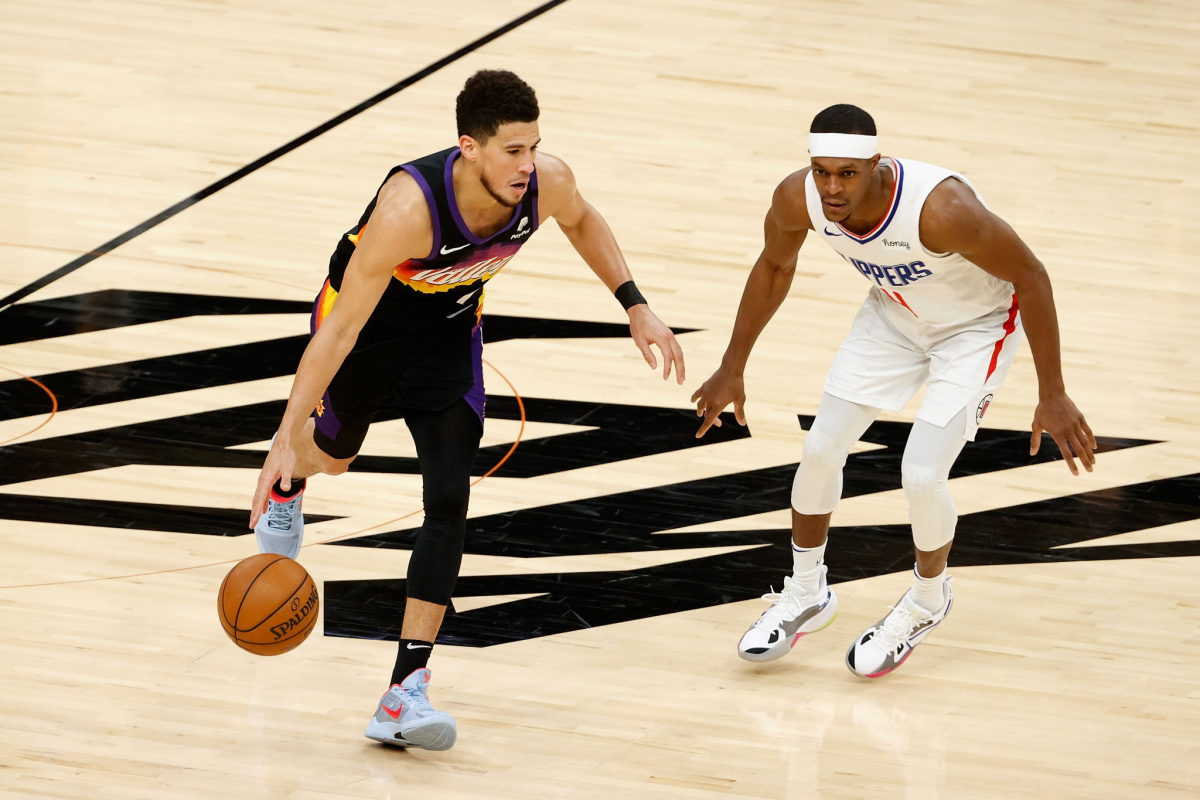Latinx Files: The DACA ruling’s real-world implications

- Share via
On Friday, U.S. District Judge Andrew Hanen ruled that the Obama-era Deferred Action for Childhood Arrivals program is illegal and ordered the Department of Homeland Security to stop processing new applications. My colleague Justin Ray has a breakdown of the decision in today’s Essential California newsletter, which you can read here.
But what does this mean for those whose livelihoods are at stake?
“It’s a lot to take in,” said Brian De Los Santos, editor of LAist and a DACA recipient. “My initial reaction was to remind myself that I’ve been here before and that I’m going to figure it out.”
In October 2017, President Trump tried to end the program but was eventually overruled by the Supreme Court. At that time, De Los Santos was working for the Los Angeles Times and wrote about the uncertainty he felt then. He’s feeling it yet again.
“I’m going to power through this, but it’s taxing. Our mental health is affected every time politicians or the courts make decisions for us,” he said.
When I asked what he does to keep any mental health issue in check, De Los Santos said he tries to parse what is out of his hands and what he can control.
“I tell myself, ‘OK, Brian, this is what you’re going to do and you’re not going to worry about this for now.’ Taking it step by step, that’s where I’ve been able to feel some sort of calmness through this storm.”
The Latinx experience chronicled
Get the Latinx Files newsletter for stories that capture the multitudes within our communities.
You may occasionally receive promotional content from the Los Angeles Times.
Agueda Pacheco, a 25-year-old writer and former journalist from Seattle, said her initial reaction when finding out the news was a sense of exhaustion.
“It’s a combination of being tired, of being overwhelmed and underwhelmed. It’s hard to fully enjoy your life.”
Pacheco is currently in Mexico as part of a study-abroad program through the California-Mexico Studies Center. She and hundreds of others were granted advance parole, which allows them to travel abroad.
She spoke fondly of her experience during our Zoom conversation, though she was quick to point out that being in Mexico was also a reminder of what the future could hold for her.
“Let’s say they take away the DACA program and I get deported back to Mexico,” Pacheco posited. “I’ve been here for a couple months, and I know that it would just be a grind — it would be like immigrating all over again. It just doesn’t feel like I have any solid ground on either side.”
It’s been nearly a decade since President Obama set up the DACA program. In that time, politicians on both sides have come out in support of granting “Dreamers” some form of legal protections through legislation. Democrats have led on the issue, and then-President Trump moved to end the program.
Yet here we are, two administrations later, and nothing has been done. The political inaction has meant loss of jobs, family separation and a life in limbo. It has meant planning a life two years at a time with uncertainty and fear.
De Los Santos, Pacheco and the hundreds of thousands like them deserve better.
Consider subscribing to the Los Angeles Times
Your support helps us deliver the news that matters most. Become a subscriber.
What’s it like being a DACA recipient in Mexico?
I asked Agueda Pacheco, whom you met in the section above, to talk about her experience being back in Mexico for the first time since coming to the United States as a child. This is what she said:
I’ve changed the way I’ve gone about my daily life. It’s like I just got to live my life to the fullest every day.
In the beforetimes, I was super on top of things. I did everything that I was supposed to do as an upstanding American. I went to college and got scholarships because I didn’t want to put that burden on my parents. I figured it out. I pulled myself up by my bootstraps and I found a job, and then I found another one. I looked so successful on paper, but I was so unhappy because it just never felt permanent.
But now, I try to just go easy on myself. I quit my job in February because I was super unhappy. And then I knew that I was going to go to Mexico. Since I’ve gotten here, I’ve really just enjoyed every moment. I feel like a normal person.
How did Latinxs fare during the pandemic?
The Pew Research Center recently published a new report that looks at how the pandemic has affected the Latinx community. Here are some of the key takeaways:
- 52% of those surveyed said that a family member or someone close to them had been hospitalized or died of COVID-19.
- 49% of Latinxs said they had lost a job or had their pay cut because of the pandemic.
- 65% said they struggled with finding adequate child care during the pandemic.
- Despite the pandemic hardships, 49% said they were satisfied with the current direction of the country, and 65% said they believed the worst part of the pandemic is behind us.
You can find the complete report here.
Things we read this week that we think you should read
— A quick housekeeping note: The next episode of “Fernandomania @ 40” will come out in five weeks. In the meantime, we will be publishing mini-episodes of material that didn’t make it into the episodes. This week, legendary Dodger announcer Jaime Jarrín talks about the time he was with Fernando Valenzuela at Wrigley Field during the height of Fernandomania. You can watch it here.
— In case you missed it, Sarah Wire had this Column One that draws parallels between the politically galvanizing effect that Proposition 187 had for Latinxs after it was passed in 1994 and how the same thing could be happening again in California in the post-Trump era. This story is also available in Spanish.
— The Olympics are upon us. My colleague Kevin Baxter wrote about how this year’s Mexican Olympic soccer team could be a preview of what the future of El Tri could look like for years to come, drawing parallels to the 2012 Olympic squad that won the gold medal.
— For Harper’s Magazine, author Héctor Tobar traveled across the United States to try to figure out what Latinx identity means. “Like all labels, Latino is to some extent a fiction, a story we tell about ourselves,” he writes. “But what, if anything, does this story mean?”
The best thing on the Latinternet: La leyenda del Booki

On Tuesday night, the Milwaukee Bucks defeated the Phoenix Suns to win their first NBA title in 50 years. By doing so, they denied Devin Booker, “the greatest Mexican basketball player ever,” from getting his first championship ring. That’s right. Devin Booker is one of us. His mother is Mexican American and Puerto Rican.
Booker’s heritage became a topic of online chatter during the Suns’ playoff run, resulting in a friend of mine giving him the Mexican nickname of “El Booki”— a nod to the iconic Mexican band Los Bukis — and another making one of the better photoshopped memes I’ve seen in a while.
Beyond the memes and online banter, Booker’s Latinx roots have deeply resonated with Mexican Americans fans in Phoenix. They’ve embraced him, and in turn he has embraced them. For the Ringer, the homie Paolo Uggetti wrote about this special relationship between the city and its star.
The Latinx experience chronicled
Get the Latinx Files newsletter for stories that capture the multitudes within our communities.
You may occasionally receive promotional content from the Los Angeles Times.







